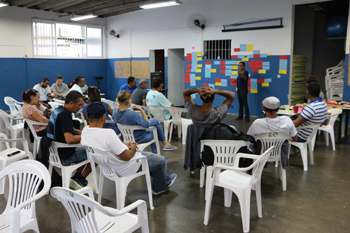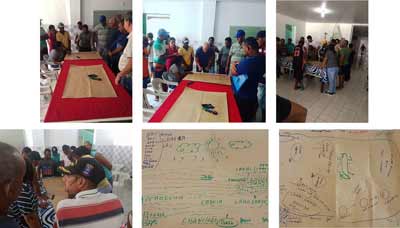The Application of the Ecosystem Approach to Fisheries in the construction of the Shrimp Fisheries Management Plan in Brazil
The main objective of the FAO REBYC-II LAC project is to reduce food waste/discards and to support livelihoods in fishing communities by improving the management and sustainable use of bycatch in the shrimp trawling fishery. One of the main innovations of the REBYC Project in Brazil was the application of the Ecosystem Approach to Fisheries (EAF) to build the National Shrimp Fishery Management Plan, through a participatory process involving all the stakeholders. In fact, for the first time in the history of fisheries management in the country, a management plan is being built in a broadly participatory way, starting from the traditional knowledge of fishers from local fishing communities, scaling up to the National Standing Committee for the Management of the Shrimp Fisheries, who has the final responsibility to adopt the plan.
 Applying the Ecosystem Approach to Fisheries Management, in Jaraguá, Alagoas: the engagement of the local fishing Community in drafting the Plan. |
With most of the field activities having started in the second semester of 2017, the project initially gathered information on the bycatch of the shrimp fishery in the four pilot sites, which were distributed in four regions: North (Belém – PA), Northeast (Sirinhaém, PE), and South/Southeast (Itajaí-SC), including 2 artisanal fisheries and 2 industrial ones. A baseline of the bycatch, including destination of discards, was assessed, using a broad literature review and raw data from observers on board. In parallel, a catalogue of the fishing boats and fishing gears and methods was prepared, as well as an extensive review of the regulatory framework related to the shrimp fishery. On another front, a zero-draft of the National Management Plan for the Shrimp Fishery was prepared to serve as a basis in the consultation process to be conducted using the Ecosystem Approach to Fisheries (EAF) as a methodology to ensure a broad participation of stakeholders.
 The tree of problems and the solution matrix. |
In order to build national capacity to use the EAF methodology to build the National Plan for the Management of the Shrimp Fishery, a kick-off workshop was held in Brasilia, with the support from FAO's REBYC-II LAC project, the CLME+ project and the national Secretary of Aquaculture and Fisheries of the Ministry of Agriculture, Livestock and Food Supply (SAP/MAPA), from November 26 to 30, 2018. During that event, 35 (thirty-five) participants were trained, including representatives from different governmental agencies (CEPSUL/ICMBio, MMA, Resex/ICMBio, EMATER- PR, EMATER- RS, FIPERJ, Sao Paulo Fisheries Institute, IFES, IFMA); artisanal fishing communities, fishing industry (SINDIPI, SAPERJ), seafood processing industry (AMASA), union representatives and academica (UFPA, UFPI, UFC, UFRN, UFAL, UFPR, UNIVALI, FURG, UFRPE).
After the training course provided by FAO, in Brasilia, each trained multiplier/facilitator created their own network of partners in their respective state, expanding the REBYC project in Brazil, from the 4 Pilot Sites originally planned to 15 out of 17 coastal states: Pará, Maranhão, Piauí, Rio Grande do Norte, Paraíba, Pernambuco, Alagoas, Sergipe, Bahia, Espírito Santo, Rio de Janeiro, São Paulo, Paraná, Santa Catarina, Rio Grande do Sul. The only 2 coastal states that were left out were Ceará and Amapá, simply because they have no significant shrimp fishery. In each of these 15 coastal states, then, a state focal point trained to apply the EAF became a direct partner of the REBYC project, adding also its home institution, raising the number of organizations partners in the project to 17, including: 9 Universities (UFPA, UFRA, UFPI, UFRN, UFRPE, UFAL, UFPR, UNIVALI, and FURG), 2 Federal Instituted (IFMA, IFES), 2 Research Centers (CEPSUL, CEPNOR), 2 State Fisheries Institutes (São Paulo Fisheries Institute, FIPERJ), 2 state research and extension agencies (EMATER-SC and EPAGRI-RS). In addition, aiming at amplifying and disseminating the project and the EAF, the State level, some of the states, such as Rio de Janeiro and Santa Catarina, held their own training workshops on EAF, in which close to 50 additional multipliers were trained for the participatory construction of the Management Plan for the Shrimp Fisheries in Brazil.
In order to ensure a broad, transparent and participatory process in the construction of the Shrimp Fisheries Management Plan, involving the main actors involved in the shrimp fishing, independent and complementary workshops were planned in three levels of actions, namely: municipal/fishing community, state and regional. Participatory workshops at the municipal level were held to allow the main fishing communities involved in the shrimp fishery, including not only the fishers themselves but all other actors engaged in the shrimp production chain (e.g. processors, traders, fishing vessel owners, etc.). The state-level meetings were planned to consolidate the proposals/views, by each coastal state having a significant shrimp fishery, including, therefore, the participation of at least two representatives from each of the local meetings, to convey their views, plus other state and non-governmental actors and, finally, the regional workshops (north, northeast, southeast and south), were planned to consolidate the National Plan for the Management of the Shrimp Fishery, taking into account all the contributions, which will then be delivered to the National Standing Committee for the Management of the Shrimp Fishery, for the scrutiny and approval, before adoption and publication by the Secretary of Aquaculture and Fisheries of the Ministry of Agriculture, Livestock and Supply. Each of these participatory and training workshop have helped to expand and strengthen the REBYC Project in the country, as well as the application of EAFM, allowing, for the first time in Brazilian history, the direct participation of local fishing communities in drafting the National Plan for the Management of the Shrimp Fishery, giving them the opportunity to identify the problems they face, as well as to propose solutions, in order to make the shrimp fishery more sustainable.
Approximately 60 (sixty) Local Participatory Workshops are planned, of which 43 will be directly conducted by the REBYC Project and 16 by the multipliers trained by the Project. Then, there will be the 15 State Participatory Workshops, followed by the 4 Regional Participatory Workshops. The local workshops started on April 1st, 2019, and will last until the end of July. Thirty participatory local workshops were already held, covering 11 states: Alagoas, Rio de Janeiro, Rio Grande do Norte, Sergipe, Paraná, São Paulo, Maranhão, Piauí, Santa Catarina, Pernambuco, Espírito Santo; and more than 60 fishing communities, distributed in 11 states, and involving about 1,000 people, most of them fisheries. These local workshops already carried out have indicated the following main problems: (1) inadequate time-area closures; (2) difficulties with government institutions, in particular for the fishers to obtain their documentation, as fishers, to receive the social insurance during the time-area closure, and abusive behavior by fishing inspectors; (3) high cost of fuel; (4) lack of social and government appreciation of their activity as fishers; and (5) legal insecurity. Other problems raised were the high degree of informality in their work, as fishers; the large amount of little in the sea; and the growing number of fishing exclusion areas, due to other activities, such as oil and gas exploitation.
The REBYC Project operated in all three levels of government (federals, state and municipal) and it is not an exaggeration to affirm that it has been the main driving force in changing the way fisheires management has always been done in Brazil, based on the Ecosystem Approach to Fisheries, applied to a participatory process for the construction of the National Plan for the Management of the Shrimp Fishery. This is the first time in Brazilian history that a fisheries management plan is being built with ample participation of all stakeholders, based on principles of social participation, good governance and adaptive management. The project spilled over from the 4 pilot sites to 15 out of 17 costal states in the country, being truly embraced by the fisheries sector, which is already claiming to expand it to other fisheries. In this context, the importance of the FAO training course on the Ecosystem Approach to Fisheries Management can’t be overestimated. It was the seed that allowed the growth of a tree of engagement and participation, with several branches, that are now bearing many fruits.
